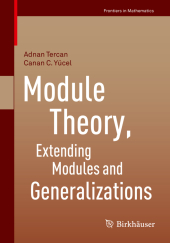 Neuerscheinungen 2016Stand: 2020-02-01 |
Schnellsuche
ISBN/Stichwort/Autor
|
Herderstraße 10
10625 Berlin
Tel.: 030 315 714 16
Fax 030 315 714 14
info@buchspektrum.de |

Adnan Tercan, Canan C. Yücel
(Beteiligte)
Module Theory, Extending Modules and Generalizations
1st ed. 2016. 2016. xx, 369 S. 240 mm
Verlag/Jahr: SPRINGER, BASEL; BIRKHÄUSER BASEL 2016
ISBN: 3-03-480950-6 (3034809506)
Neue ISBN: 978-3-03-480950-4 (9783034809504)
Preis und Lieferzeit: Bitte klicken
The main focus of this monograph is to offer a comprehensive presentation of known and new results on various generalizations of CS-modules and CS-rings. Extending (or CS) modules are generalizations of injective (and also semisimple or uniform) modules. While the theory of CS-modules is well documented in monographs and textbooks, results on generalized forms of the CS property as well as dual notions are far less present in the literature.
With their work the authors provide a solid background to module theory, accessible to anyone familiar with basic abstract algebra. The focus of the book is on direct sums of CS-modules and classes of modules related to CS-modules, such as relative (injective) ejective modules, (quasi) continuous modules, and lifting modules. In particular, matrix CS-rings are studied and clear proofs of fundamental decomposition results on CS-modules over commutative domains are given, thus complementing existing monographs in this area.
Open problems round out the work and establish the basis for further developments in the field. The main text is complemented by a wealth of examples and exercises.
Preface.- Introduction.- List of Symbols.- Introducing modules.- Types of Relative Injectivity.- Extending Property and Related Concepts.- Inner Generalizations of Extending Modules.- Outer Generalizations of Extending Modules.- Dual Goldie and EC-complement Versions of the Extending Property.- Open Problems and Questions.- Appendix.- References.- Index.
"Notably, each chapter ends with a (shorter or longer) list of exercises complementing the material of the book as well as with some useful historical and bibliographical remarks. ... The book is well written, and takes readers thoroughly into the theory of extending modules and their generalizations. I consider this volume a valuable tool and source of inspiration both for students interested in future research in an active field of algebra and for working researchers." (Septimiu Crivei, Mathematical Reviews, May, 2017)
"The book is addressed to students and researchers in module and ring theory. It will undoubtedly be a valuable tool for everybody working in this area. Finally, it should be mentioned that the authors have made a well-thought-out effort to improve and refine the terminology on the subject." (Bin Zhu, zbMATH 1368.16002, 2017)


